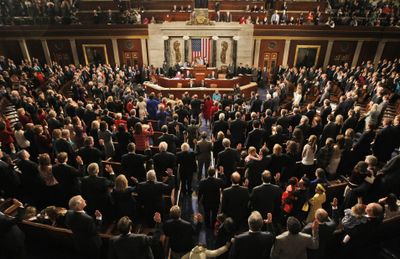New Congress swears in members
Burris not seated; Feinstein signals possible shift

WASHINGTON – The 111th Congress began Tuesday with debates over how to ease the nation’s worsening recession and to fight a pair of wars overseas, adding a sense of gravity and purpose to a day normally dedicated to symbolism and the swearing-in of members.
Veterans as well as newcomers to the House and Senate said the immensity of the problems the nation faces created an opportunity to move beyond the bitter partisan battles of the last decades or, conversely, to descend into legislative gridlock that would further damage a body already suffering from historically low approval ratings.
“There’s something transformational happening here,” said Sen. Christopher Dodd, D-Conn., a 34-year veteran of Congress. “It’s the kind of year historians will write about. … Can this institution deal with it?”
While the mood in the Senate was one of bipartisan consensus, Republicans in the House accused Democrats of rewriting the rules to strip away what little power they have left. Brushing aside the criticism, House Speaker Nancy Pelosi, D-Calif., vowed quick action on an economic stimulus plan, universal health care and climate change legislation, among other issues that have stalled during the Bush administration.
“We need action, and we need action now,” Pelosi said.
With a minimum of 256 members in her caucus after Election Day provided big gains for Democrats, Pelosi swore in the largest majority either party has held since 1993. In the Senate, seven seats had to be physically removed from the right side of the chamber and bolted down on the left side of the aisle to accommodate Democratic newcomers.
Democrat Al Franken, who has been certified as the winner of a Senate seat from Minnesota, did not join his colleagues in the Capitol Tuesday, after Republican Norm Coleman announced he would file a legal contest to the ruling by state election officials that Franken defeated him by 225 votes. The legal action could delay the seating of Franken for weeks or even months.
If Franken prevails and the controversy surrounding the successor to President-elect Barack Obama is settled, Democrats will hold 59 seats in the Senate, the largest majority either party has claimed since the Carter administration. Democrats would be one vote shy of the 60 needed to thwart filibusters.
In a dispute over another contested Senate seat, Roland Burris failed to capture President-elect Barack Obama’s old Senate seat in a wild piece of political theater, but the Democrats’ opposition cracked when a key chairwoman said seating him was simply the legal thing to do.
Democratic leaders, set to meet with Burris today, were searching for a way to defuse the dispute before it further overshadows the 111th Congress. Knowledgeable Senate officials of both parties widely predicted that the saga would end with Burris being seated.
Seating Burris seemed more likely late Tuesday, when Sen. Dianne Feinstein rejected the reasoning that all of the chamber’s Democrats, herself included, had cited in a letter last week – that corruption charges against Burris’ patron, Illinois Gov. Rod Blagojevich, tainted his appointment.
“Does the governor have the power, under law, to make the appointment? And the answer is yes,” said Feinstein, chairwoman of the Senate Rules Committee, which judges the credentials of senators.
Burris marched into the Capitol earlier Tuesday, declaring himself “the junior senator from the state of Illinois.” But Secretary of the Senate Nancy Erickson rejected his certification, as he knew she would, saying it lacked Illinois Secretary of State Jesse White’s signature and the state seal.
Late Tuesday, Feinstein urged the Senate to settle the matter.
“If you don’t seat Mr. Burris, it has ramifications for gubernatorial appointments all over America,” the California senator said. “Mr. Burris is a senior, experienced politician. He has been attorney general, he has been controller, and he is very well-respected. I am hopeful that this will be settled.”